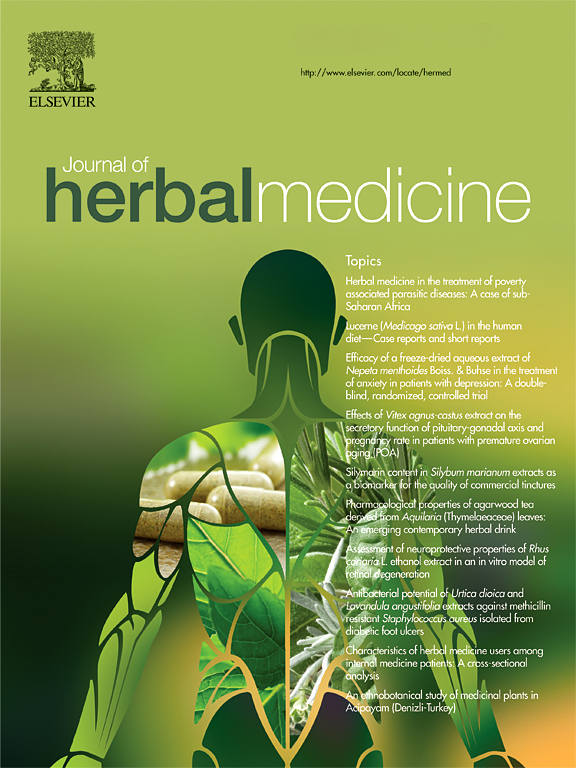评估丹红注射液治疗慢性稳定型心绞痛的整体价值:中国的多标准决策分析
IF 1.9
4区 医学
Q2 INTEGRATIVE & COMPLEMENTARY MEDICINE
引用次数: 0
摘要
导言本研究旨在评估丹红注射液(DHI)治疗慢性稳定型心绞痛(CSA)的整体价值,并确定 DHI 的治疗特点。方法采用成熟的评估指标体系评估 DHI 的整体价值,该体系包括基于多标准决策分析(MCDA)模型的 34 项标准。每项标准由七位专家根据 DHI 治疗 CSA 的文献综述证据矩阵进行评分。通过汇总这些绩效分数和预先确定的权重,评估了 DHI 治疗 CSA 的总体价值。此外,还计算了每个领域和标准对总体价值估计的贡献。结果我们发现,DHI 治疗 CSA 的综合价值估计值为 80.18 分。安全和风险管理 "领域对最终估计值的贡献最大(30.37),其次是 "有效性"(23.75)。在 6 个评价领域中,"受疾病影响的人口规模"(3.79)、"有毒药用材料的风险控制"(4.38)、"非医疗成本比较"(1.14)、"药物作用机制的明确性"(0.6)、"药用材料资源的可持续性"(1.91)和 "患者依从性"(4.59)等标准对总体估计值的贡献最大。结论与单纯的标准治疗相比,DHI 被认为是 "良好水平 "的干预措施。本文章由计算机程序翻译,如有差异,请以英文原文为准。
Assessing the holistic value of Danhong injection for chronic stable angina: a multi-criteria decision analysis in China
Introduction
This study aimed to assess the holistic value of Danhong injection (DHI) for treating chronic stable angina (CSA) and to identify the therapeutic characteristics of DHI.
Methods
The holistic value of DHI was assessed using a well-established evaluation index system including 34 criteria based on the Multi-criteria decision analysis (MCDA) model. Each criterion was rated by seven experts based on an evidence matrix comprising a literature review on DHI for treating CSA. The overall value of DHI for the treatment of CSA was evaluated by aggregating these performance scores and predetermined weights. Additionally, the contributions of each domain and criterion to the overall value estimate were calculated. Uncertainty was explored using an online retest and intra-rater correlation coefficient (ICC).
Results
We found that the comprehensive value estimate of DHI for treating CSA was 80.18 points. The domain of “safety and risk management” was the strongest contributor to the final estimated value (30.37), followed by “effectiveness” (23.75). The criteria “size of population affected by disease” (3.79), “risk control of toxic medicinal materials” (4.38), “comparative non-medical costs” (1.14), “clarity of the mechanism of drug action” (0.6), “sustainability of medicinal materials resources” (1.91) and “patient compliance” (4.59) were found to be the most significant contributors to the overall value estimate across the 6 evaluation domains. The initial scores for DHI over the two rounds showed good consistency across panelists (ICC = 0.886 [0.858–0.909]).
Conclusion
Compared with standard treatment alone, DHI was perceived as being at a “good level” intervention.
求助全文
通过发布文献求助,成功后即可免费获取论文全文。
去求助
来源期刊

Journal of Herbal Medicine
INTEGRATIVE & COMPLEMENTARY MEDICINE-
CiteScore
3.90
自引率
0.00%
发文量
94
期刊介绍:
The Journal of Herbal Medicine, the official journal of the National Institute of Medical Herbalists, is a peer reviewed journal which aims to serve its readers as an authoritative resource on the profession and practice of herbal medicine. The content areas of the journal reflect the interests of Medical Herbalists and other health professionals interested in the clinical and professional application of botanical medicines. The objective is to strengthen the research and educational base of herbal medicine with research papers in the form of case studies, original research articles and reviews, monographs, clinical trials and relevant in vitro studies. It also publishes policy statements, opinion pieces, book reviews, conference proceedings and profession related information such as pharmacovigilance reports providing an information source for not only the Herbal Practitioner but any Health professional with an interest in phytotherapy.
 求助内容:
求助内容: 应助结果提醒方式:
应助结果提醒方式:


